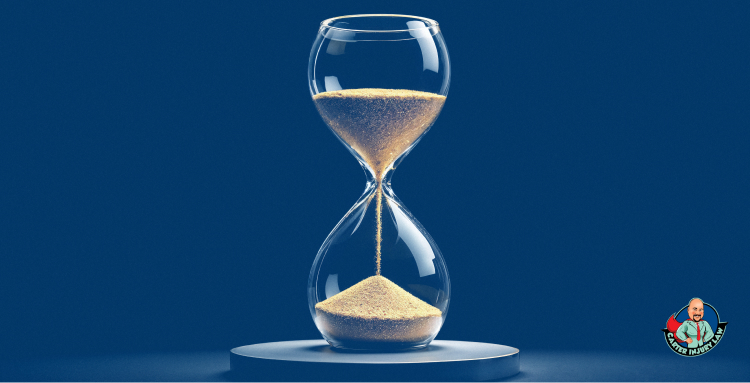
blog
March 25, 2025
How Long Will Your Personal Injury Case Take? Carter Injury Law Reveals the Truth

The first question that inevitably crosses every client’s mind is, “How long is this going to take?” And rightfully so. After an accident, you need answers—and you need them fast. The thing is, the timeline for your case can vary. Some cases settle quickly, while others might take a bit longer, depending on a number of factors.
It could be that the insurance company is responsive and the facts of the case are clear, or maybe there are complications along the way that extend the process. The key is understanding that the timeline is fluid—it depends on how fast things move along, what challenges arise, and how the other side responds. However, I’ll give you a general timeline and walk you through each phase so you’ll know exactly where things stand.
Phase 1: The First Month – Investigation Begins
The moment you sign up, we get to work. No waiting around, no delays. We start building your case from day one because the stronger the foundation, the better your outcome.
Sending Letters to Insurance Companies
One of the first things we do is notify the insurance companies. We send out letters letting them know we’re representing you, and we start gathering critical information—what policies are in place, what coverage limits exist, and what potential defenses they might throw at us.
Finding Out About Insurance Coverage and Possible Defenses
Insurance companies don’t just hand over money; they look for ways to reduce or deny your claim. So, we dig into the details. How much coverage is available? Are they trying to claim you were partially at fault? We uncover these answers early so there are no surprises down the road.
Investigating Slip-and-Fall Cases
If your case involves a slip-and-fall, we act fast. We reach out to the property owner, their insurance company, and anyone else involved. Our investigator gets out to the scene, takes photos, and documents everything before evidence fades. If you have pictures, we’ll use those too—because solid proof makes it harder for them to deny liability.
Phase 2: The Next 5-6 Months – Medical Treatment & Recovery

This part of your case isn’t about negotiations or legal battles—it’s about you. Your health comes first. The goal is to heal, to get as close as possible to the life you had before the accident. We don’t rush this process because settling too soon could leave you with unpaid medical bills and ongoing pain.
Medical Visits, Treatment Plans, and Documenting Injuries
During this time, you’ll be seeing doctors, following treatment plans, and doing everything necessary to recover. Every appointment, every test, and every diagnosis is documented because those medical records are going to be the backbone of your case. The more thorough your treatment history, the stronger your claim.
The Importance of Following Through with Doctor Visits
One thing insurance companies love to argue is that you weren’t really injured. If you skip appointments or stop treatment too soon, they’ll use that against you. They’ll say, "If you were really hurt, you would have kept going to the doctor." That’s why we tell our clients—follow through. Keep going until your doctor says you’re fully recovered or you’ve reached the best possible outcome.
Focus on Feeling Better Before Settling
We never push for a quick settlement before you’re ready. Because once you settle, that’s it. You can’t go back and ask for more if your injuries turn out to be worse than expected. So, take your time, focus on healing, and when the time is right, we’ll fight to get you the compensation you deserve.
Phase 3: Around 7-8 Months – Making a Demand
A "demand" is our way of saying, "It’s time to settle this." We’ve gathered all the facts, the evidence, and your medical records. Now, we package everything up and send it over to the insurance company or the defendant, telling them, "Here’s what we think your responsibility is, and here’s the amount we’re expecting to settle the case." This is the point where we take all our hard work and put it into a formal request.
Packaging Medical Records, Bills, and Investigation Findings
We carefully organize everything—the medical records, bills, photos, investigation results—and put it all together in a neat, professional package. This shows the insurance company the full picture—how your injuries have affected your life and why the amount we’re requesting is fair.
Sending It to the Insurance Company to Settle the Case
Once we’ve got everything put together, we send the demand off to the insurance company or the responsible party. From here, it’s in their hands. However, don’t expect an immediate response. They’ll need time to review everything, check the details, and decide whether they’re going to meet our demand or not.
Expected Response Time (30-90 Days, Sometimes Longer for Government Agencies)
Most of the time, you’ll get a response within 30 days, but depending on the situation, it can take anywhere from 30 to 90 days. If the case involves a government agency, it could take even longer. Government entities often take more time to respond, but rest assured, we actively follow up to ensure they don’t delay unnecessarily.
Phase 4: 8-10 Months – Settlement or Lawsuit?

By the time we reach the 8-10 month mark, we’ll have an idea of what your case is worth based on the offer from the insurance company. The question is, Do you take it, or do you fight for more in court?
What Happens If the Offer is Fair?
If the insurance company comes back with a fair offer that properly compensates you for your injuries, medical bills, and lost wages—it might be time to settle. The advantage here is that you get your money and move on with your life without the stress or uncertainty of a lawsuit. We’re not here to drag things out if a fair settlement is on the table.
What If It’s Too Low?
If the offer is too low, that’s a problem. We don’t settle for less than what your case is worth. We’ll go back to the table and negotiate harder, and if we can’t get the insurance company to budge, we’ll advise you to take it to court. They can’t intimidate us into accepting a lowball offer, and we’ll make sure your case is treated fairly.
Some Companies Refuse to Respond—What Happens Next?
There are cases where the insurance company just doesn’t respond. They ignore us, hoping we’ll give up. That’s when we kick things up a notch. If they’re not responding to our demand, we move forward with filing a lawsuit. They’ve had their chance to settle, and now it’s time for them to face us in court.
Phase 5: 10-12 Months – Case Closure or Lawsuit Filing
If all goes well and the insurance company offers a fair settlement, we'll call you in to hand over the check and walk you through the closing documents. Once you sign, your case is wrapped up, and you’re compensated for your injuries. This is the ideal outcome we aim for from the start. However…
If No Fair Settlement, Lawsuit Filing Begins
Now, if the settlement offer hasn’t been fair, or if the insurance company is still playing hardball, that’s when we step up our game. We’ll file a lawsuit and take your case to court. It’s a big step, but it’s one we’re ready for.
Gathering Documents and Information for Court
Once you’ve made the decision to file a lawsuit, it’s all about preparation. We’ll gather everything we need to present a strong case in court. This includes medical records, bills, witness statements, photos, and anything else that supports your claim. We’ll make sure your case is solid and that we’re ready for whatever the defense throws at us.
To get a better sense of how long the entire process could take, check out our video where we break it down for you in detail:
Phase 6: 12+ Months – The Court Process Begins

The courts are backed up. Whether it's the effects of COVID or the new laws that rolled out in March of 2023, there’s a lot of cases on the docket, and that means delays. The court system is underfunded and overwhelmed, and while we do everything we can to keep your case moving, it’s out of our hands once it’s in the court system.
Differentiated Case Management Orders – What They Mean for Your Case
Once we get into the court system, you’ll likely encounter "differentiated case management orders." These are the judge’s orders that will govern how your case moves along. They outline timelines for what happens next, and they’re meant to keep the case on track. But, remember, just because there’s a schedule doesn’t mean things will always go according to plan. With everything going on in the courts right now, we might see delays.
Depositions: What to Expect When Talking to the Opposing Attorney
One of the first things that’ll happen in court is the deposition. This is where you sit down with the opposing attorney, and they ask you questions under oath about your case. It’s part of the discovery process, and while it might feel intimidating, we’ll make sure you’re prepared. You’ll be asked about the details of your accident, your injuries, and the impact it’s had on your life. It’s also important to be honest and clear.
Mediation: Most Lawsuits Settle at This Stage (10-12 Months After Filing)
Now, most lawsuits settle during the mediation stage, which usually happens between 10 and 12 months after we file the lawsuit. Mediation is a chance for both sides to sit down and try to reach a settlement before going to trial. Both sides present their cases to find common ground. If we settle, you get paid; if not, we fight for you in court. Either way, we’re pushing for the best outcome.
You Might Also Enjoy These Helpful Reads:
Understanding the Statute of Limitations for Personal Injury Cases in Florida
What Damages Can You Recover in a Florida Personal Injury Case?
How to Secure Personal Injury Compensation in Florida Expert Tips from Carter Injury Law
The Harsh Truth: Why Trials Can Take Years

Trials can take 2 to 3 years due to delays in the court system, including backlogs and other unforeseen factors. While this timeline is beyond our control, the best approach is to stay patient.
Delays Aren’t the Lawyer’s Fault
I know it can be frustrating when things are moving slowly. However, delays aren’t really our fault. They’re part of the system we’re working in. The courts are overloaded, and while we fight to keep your case moving, sometimes it takes longer than expected. This isn’t something that’s under our control, and it’s definitely not because we’re not doing our job. We’re pushing hard, but we also need you to be patient and trust the process.
Some Cases Settle Before Trial, but Lawsuits Often Increase Case Value
While most cases settle before trial, sometimes filing a lawsuit can actually increase the value of your case. Insurance companies know that once a lawsuit is filed, the stakes are much higher. They can no longer drag their feet or offer lowball settlements. A lawsuit signals that you’re serious and ready to fight, and that often pushes the other side to make a fair offer. So, while it may seem like the trial process is dragging on, it can actually lead to a better result in the end.
What Are Your Next Steps?
Every case is different, and that’s why it’s important to get a personalized timeline for your specific situation. The general timeline I’ve laid out gives you an idea, but I can give you a much clearer picture once I know the details of your case. So, don’t wait—pick up the phone and call us for a free consultation. It’s risk-free, and I’ll be able to give you an idea of how your case will likely unfold based on your unique circumstances.
And remember, there are no fees unless you win your case. That’s right—no fees unless we secure a settlement or win in court. So, take the next step and reach out to us. You’ve got nothing to lose and everything to gain.
Recent posts























